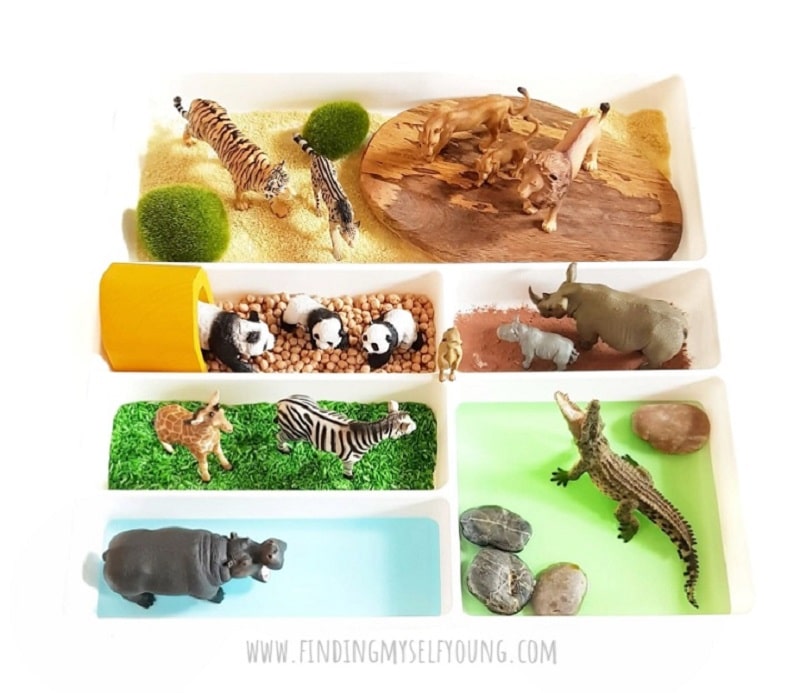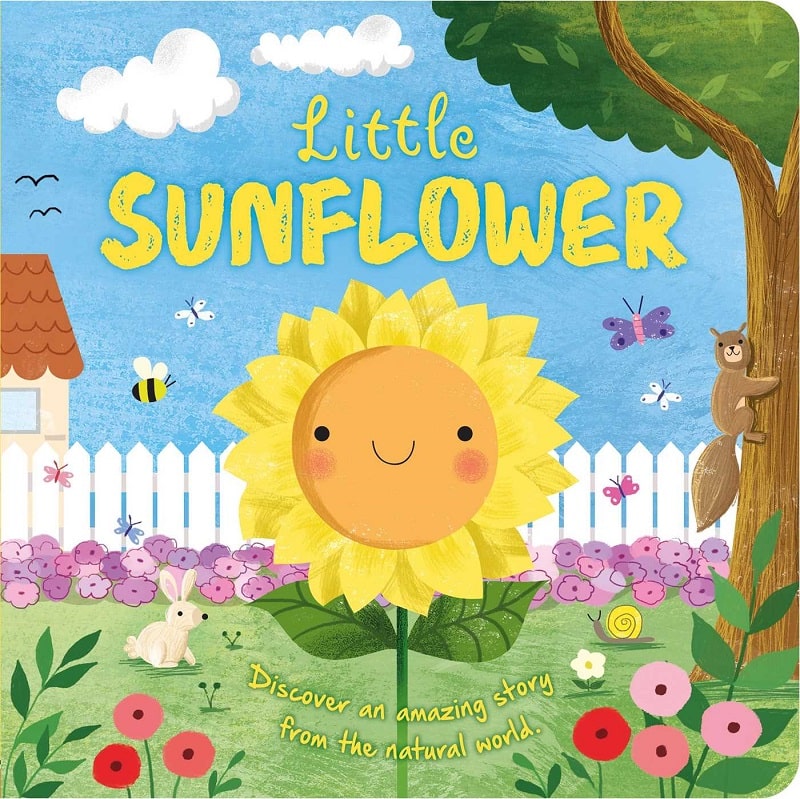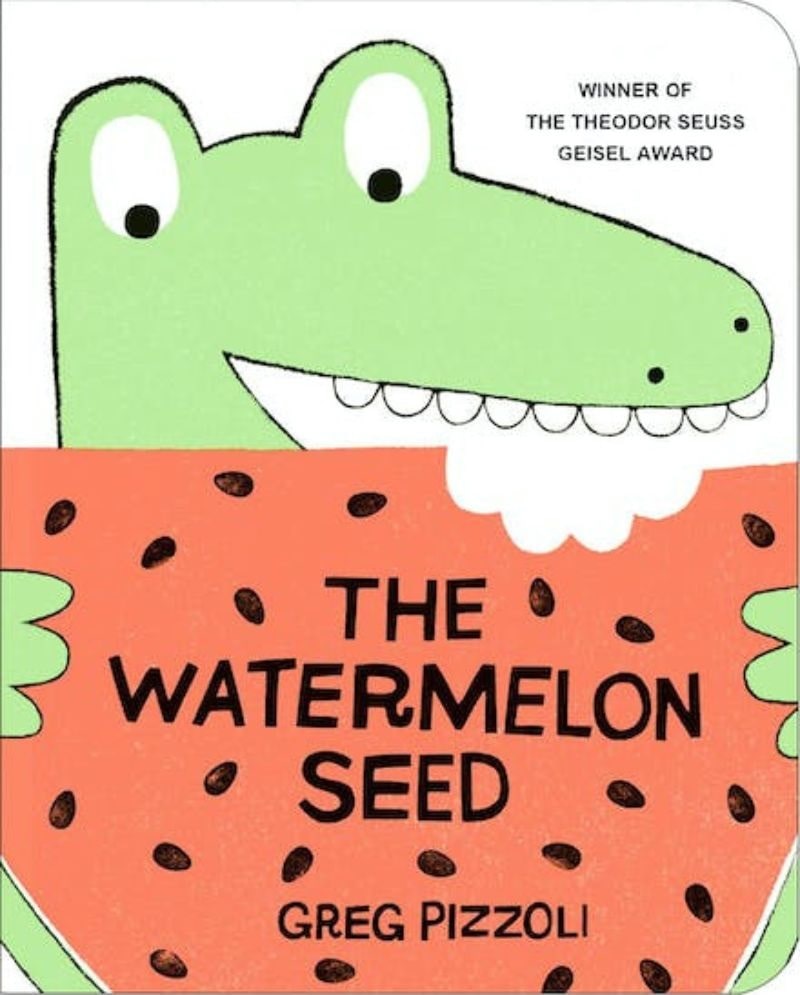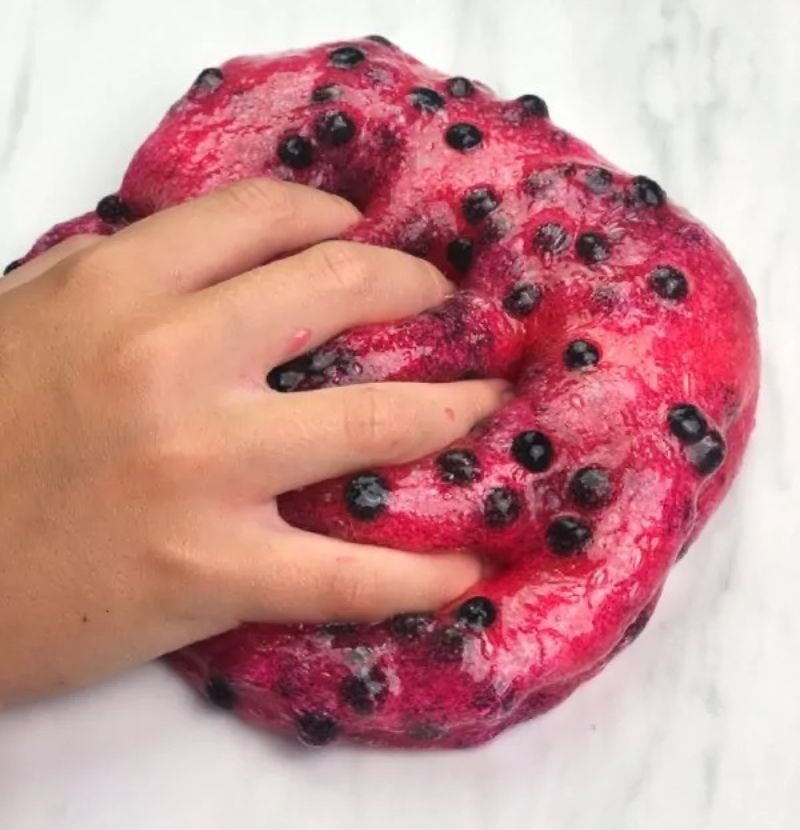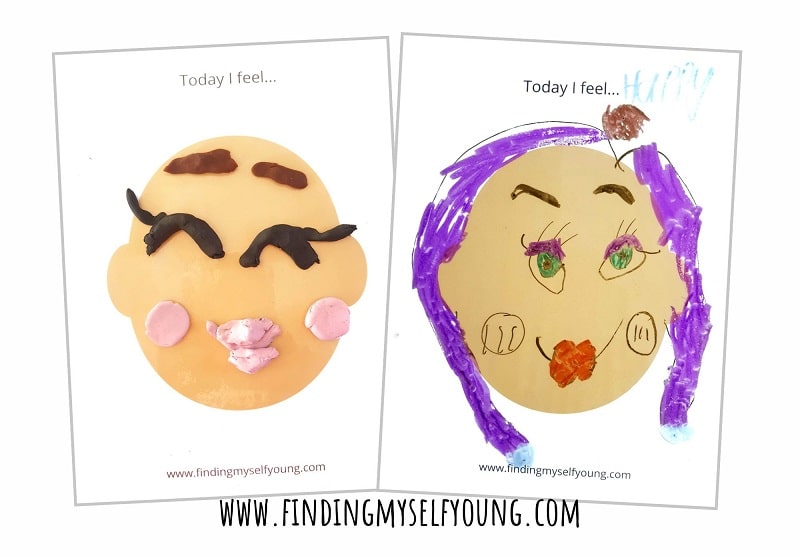I'm putting together monthly play activity schedules to make it easy for you to create a month of fun for your kids at home or in the classroom, every month of the year. The August play calendar focuses on zoo, sunflower, watermelon and all about me themed ideas for toddlers, preschoolers and school kids. The activities include a mix of art and craft, sensory, science and play ideas as well as books to read aloud during the month.
Each activity is explained in detail below, including how you can extend or adjust the activity based on your child's age. You can also download our free interactive August activity calendar pdf with links to instructions for every activity to save for future reference.
AUGUST 2024 PLAY ACTIVITY CALENDAR
This play activity calendar includes activities that can easily be done using items from around your home {or classroom} and you can substitute items to make it suit what you have on hand. If you want to be fully prepared I've set up an Amazon supply list that includes all of the main items needed for every activity during August.
There are no activities listed for weekends as they can be used for free play/family time or to catch up on activities you may have missed during the week. Below you will find detailed explanations of each activity as well as how to modify them for children of different ages and some extension activities you can do if you're looking for additional ideas.
At the bottom of this post you'll also be able to download a copy of the interactive August play calendar PDF which includes direct clickable links to all of the activities featured in this months calendar.
What do they do with all the POO from the animals at the ZOO? {Read Aloud}
A zoo has lots of animals, but what do they do with all the poo? The hippos, the tigers, the kangaroos... what do they do with all that poo? I wonder, don't you wonder too? This book is a fun way to introduce zoo animals and get kids interested in learning more about them.
Read the story aloud in a group, read the book to your child, have your child read the book to you, or watch the story being read aloud here on YouTube. You can borrow the book from a friend or the library, or get your own copy from Amazon or Amazon AU.
Extension Activity:
Ask the kids their opinion. Once you've finished reading the book ask the children themselves what they think the zoo does with the animal poo and where it goes?
Zoo Small World
Recreate your own mini zoo at home {or in the classroom} by setting up a sensory tray with different sensory bases and plastic zoo animals. We used a mix of sensory bases including raw cous cous, chickpeas, chocolate powder, green sensory rice and green and blue dyed water. We also set ours up in a cutlery tray because it's an easy way to separate and define each animal enclosure, however you can use any tray or tub you have on hand.
If you have younger children I recommend only using larger sized animals so they're easier to grasp and aren't a choking hazard. Sensory bins are a great way to encourage imaginary play, language development and social skills.
Animal Specimen Bottles
Set up your own zoo specimen museum by creating these animal specimen bottles, just like they do in a real museum when preserving animals in fluid. You'll need some plastic sensory bottles, or empty drink bottles {we use Voss plastic bottles} and some rubber animals that grow in water like these snakes or this lizard.
The kids will have so much fun watching the animals expand and turn into rubbery specimens, then they can have fun studying them by inspecting the jars. Make sure you seal the bottles very well so there are no accidents.
Kindness Zoo Colouring Pages
Children can build their fine motor skills and get creative with these free zoo animal kindness colouring pages. It includes a cover page and animals from A-Z, each with a different kindness message, which can be stapled together to make a book once complete. These can also be repurposed as part of letter of the week activities as each page focuses on a different letter of the alphabet.
Dear Zoo {Read Aloud}
I wrote to the zoo to send me a pet.... so they sent me an elephant! Lift the flaps to find out what other animals they sent instead.
Read the story aloud in a group, read the book to your child, have your child read the book to you, or watch the story being read aloud here on YouTube. You can borrow the book from a friend or the library, or get your own copy from Amazon or Amazon AU.
Extension Idea:
Dear Zoo Containers. Using the containers in the book as inspiration, draw your own containers on paper or cardboard. Match the colours, shape and size of the ones in the book. Have a look at how these teachers created cardboard Dear Zoo costumes.
Zoo Animal Masks
Your kids can become zoo animals with these free printable zoo animal masks. Download the masks and print them out on cardstock, or paper and laminate them, then cut the holes and add string or elastic to turn them into proper masks. The file includes black and white or coloured masks so children can colour their own masks too.
Alphabet Zoo Sensory Bin
This fun alphabet zoo sensory bin is a great way to combine learning about animals and letters together into a fun sensory activity. To set it up you'll need a sensory base, a variety of plastic zoo animals and some alphabet blocks or magnets. Add in the letters that correspond with the animals included in the bin. The kids can pick out an animal, say it's name and then find the matching letter.
Sunflower Craft
Children can create their own beautiful sunflower by painting with their hands then adding a green stalk and leaves and decorating the painting with seeds. You can use black buttons as seeds as shown below, or use real sunflower seeds.
Little Sunflower {Read Aloud}
Follow the journey of a sunflower from a single seed to a fully grown sunflower until it gets sleepy and turns into a seed again. This book is a fun way to share the life cycle of a sunflower with younger kids.
Read the story aloud in a group, read the book to your child, have your child read the book to you, or watch the story being read aloud here on YouTube. You can borrow the book from a friend or the library, or get your own copy from Amazon or Amazon AU.
Sunflower Sensory Bin
Set up a simple sunflower sensory bin like the one below by adding yellow sensory rice, black beans or sunflower seeds, sunflower beads or artificial sunflowers and some mini pots and scoops. You could also add in some numbers for some counting practice and other fine motor tools like handy scoopers.
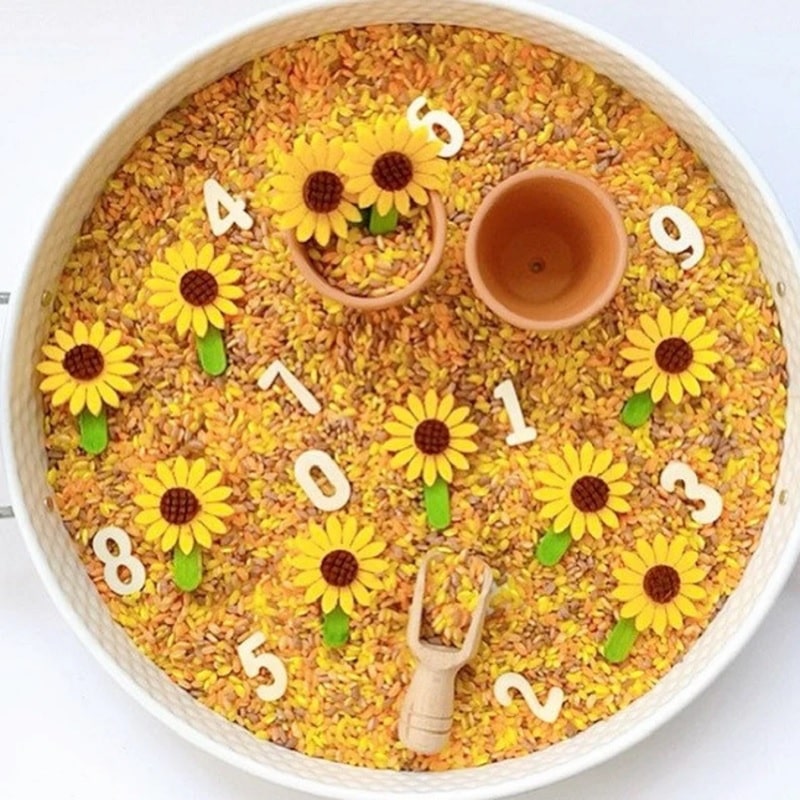 |
| Image: The Play Tribe |
Sunflower Playdough Counting Mats
Use these free sunflower playdough mats to help teach children number recognition and one to one correspondence. Use them with playdough and loose parts to fill the tens frame - using real sunflower seeds is a great way to tie in the sunflower theme.
Sunflower Life Cycle Puzzles
These sunflower life cycle puzzles are a fun way to teach children about the different stages of the life cycle - seeds, seedling, young plant and sunflower. I recommend laminating the puzzles, or printing them on cardstock for longevity, especially if you're using them in a classroom with lots of kids.
If you're teaching younger children I would use the single 5 piece puzzle as it will be easier for them to match together. Older children will be able to use the individual 3 piece puzzles. You could also get older children to help cut the puzzles out for extra scissor practice.
The Watermelon Seed {Read Aloud}
What happens when you swallow a watermelon seed? Does it grow in your belly? Do you turn into a watermelon? Find out in this book.
Read the story aloud in a group, read the book to your child, have your child read the book to you, or watch the story being read aloud here on YouTube. You can borrow the book from a friend or the library, or get your own copy from Amazon or Amazon AU.
Watermelon Playdough Mat
Download my free watermelon playdough mat as part of my free summer playdough mats. Use black playdough, black beans or black mini pom poms to give the watermelon seeds. This is also a great activity to introduce one to one correspondence and number recognition by asking children to put a certain amount of seeds on the watermelon slice.
Watermelon Volcano
Did you know you can make a volcano out of a watermelon? Follow the steps for this watermelon volcano experiment and you can create an explosive volcano complete with red lava - don't worry the lava isn't dangerous, it's the result of a bicarb and vinegar reaction.
This simple science experiment is a great way to teach children about chemical reactions in a hands on way and you only need a few items from the pantry.
Watermelon Slime
Have some ewwwy gooooey sensory fun with this watermelon slime. This slime is borax free, but you will need contact solution to make it. The watermelon seeds are black mini pom poms which add another fun texture to the slime.
Watermelon Torn Paper Craft
Get little fingers working hard to create this cute watermelon craft using torn coloured paper and finger paint. Children will need to glue down the correct colours of paper into a watermelon shape and then use black paint to add finger print seeds. This is a great craft to build hand/eye co-ordination and fine motor skills.
All About Me Questionnaire
If you're in the northern hemisphere your children are probably heading back to school at the end of this month or the start of next month, so it's a great time to fill out an all about me questionnaire. It's a fun way to record their favourite things each year and if you're a classroom teacher it's a great way to get to know your new students.
Emotions Playdough Mats
Download my free blank face playdough template and get your kids to use playdough, loose parts or washable markers {if you laminate it} to create their own face. They can add hair and facial features to represent how they see themselves either literally or how they want to look.
What I Like About Me {Read Aloud}
The things that make you different can also make you special. I'm not like you. You're not like me. That's why we think that life is great. So join us as we celebrate.
Read the story aloud in a group, read the book to your child, have your child read the book to you, or watch the story being read aloud here on YouTube. You can borrow the book from a friend or the library, or get your own copy from Amazon or Amazon AU.
Fine Motor Name Activity
Another important way to teach children about their self identity is to teach them to recognise and spell their name. The easiest way to do this from a young age is to do many different activities that expose them to their name. A simple name activity is cap names where children have to use pouch caps to cover the letters of their name. This is a great way for them to get used to the formation of the individual letters of their name and to recognise their entire name once it's finished.
If you don't have pouch lids you can use any loose parts like stones, counters, or even Lego pieces. Just be mindful to not use choking hazards with children who are still mouthing.
Split Self Portraits
A split self portrait is a great way for children to learn about their own facial features as well as symmetry in the one activity. You'll need to prep this one by taking a photo of your child and printing out half of their face onto a piece of paper. Children can then use crayons or markers to draw the opposite side of their face using the photo as a guide.
Additional Ideas:
All About Me activities. Have a look at our big list of all about me activities for more crafts, play ideas and book recommendations.
DOWNLOAD THE AUGUST PLAY CALENDAR PDF HERE
Click the download template button below to download the interactive PDF file. Each image on the PDF calendar can be clicked to go directly to the instructions for the individual activity.
Please note that this activity calendar PDF is for personal or classroom use only and may not be shared, electronically uploaded or sold on any platform. If you would like to share or feature the calendar in a blog post please link back to this post directly.
Disclosure - This post contains some affiliate links for your convenience, which means I may make a small commission at no cost to you, should you make a purchase.




